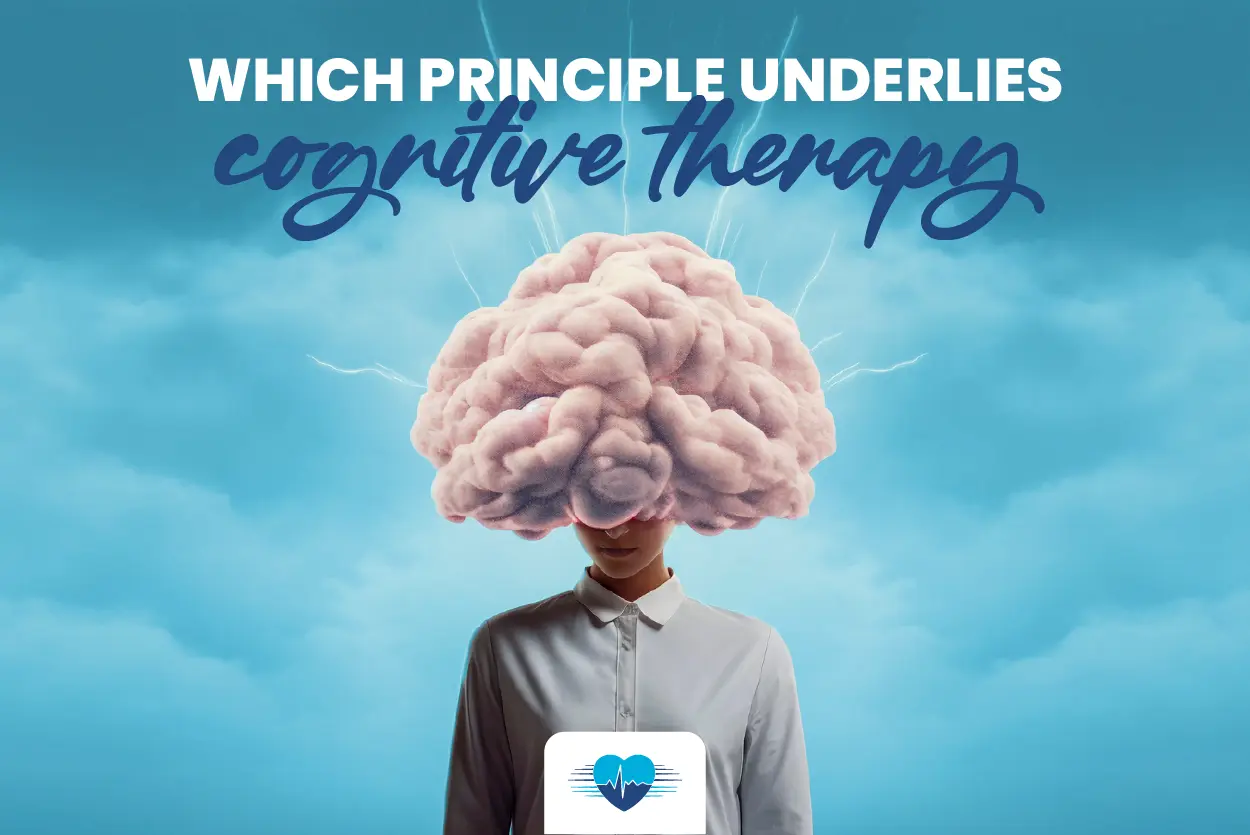Which principle underlies behavioral therapy?
Everyone feels anxious at some point in life. More than 30% of adults deal with depression and anxiety, but some treatments can help.
If you ever need help with your behavior or emotions, you can contact us at Today Telemedicine for mental health support.
Today Telemedicine offers worksheets for anxiety, trauma, ADHD, Bipolar, and more. Check out our complete collection.
Cognitive Therapy or Cognitive Behavioral Therapy (CBT) is the best talk therapy for problems like anxiety and depression.
The question is, “Which Principle Underlies Cognitive Therapy?”
But first Know about “what principle underlies cognitive therapy” We need to learn all about Cognitive Behavioral Therapy.
So, please continue reading,
What is CBT (Cognitive Behavioral Therapy)?
Cognitive Behavioral Therapy (CBT) is a type of therapy that helps people by focusing on how their thoughts, feelings, and actions are connected.
The main idea is that if you change your negative thoughts, you’ll start to feel better and act more positively.
It’s like a practical guide to handle things better, improve your thinking, and make your mind healthier.
Who Invented Cognitive Behavior Therapy (CBT)?
In the 1960s, Dr. Aaron Beck came up with Cognitive Behavioral Therapy (CBT), which says our thoughts affect how we feel and act.
Beck believed that by changing our thoughts, we can make positive changes in our emotions and behavior.
Through experiments, like the “dysfunctional beliefs questionnaire,” he found that people with mental health issues think differently than those without.
Changing these thoughts, according to Beck, can lead to better emotions and behaviors.
Three Basic Principles of Cognitive Therapy
Dr. Aaron T. Beck identified three foundational levels of thinking:
1: Core Beliefs
Core beliefs, rooted in early experiences, shape negative views about oneself, the world, and the future and promote feelings of worthlessness, neglect, and pessimism.
2: Dysfunctional Assumptions
Dysfunctional Assumptions happen when we focus too much on the negatives, making our view of reality twisted and causing us to misinterpret things.
These are unhelpful thought patterns exaggerated by negative feelings.
3: Automatic Negative Thoughts
Automatic Negative Thoughts (ANTs) are quick, negative thoughts that appear habitually.
Finding them can be tricky because they don’t last long and make you feel negative.
You can make them better by changing them to more positive thoughts on purpose.
Which Principle Underlies Cognitive Therapy?
The fundamental principle of cognitive-behavioral therapy is that thoughts and emotions significantly influence behavior.
Sometimes, these thoughts and reactions can lead to behaviors that hurt ourselves and others.
Cognitive therapy assists us to find and change negative thoughts, helping to solve problems and build healthier habits by looking at things in a more balanced way.
So, let’s read about “What principle underlies cognitive behavioral therapy?”
There are some behavioral principles underlie cognitive behavior therapy. These principles include:
Goal-Oriented and Problem-Focused
Cognitive Behavioral Therapy (CBT) starts by concentrating on addressing specific problems through a goal-oriented approach.
In this procedure, the therapist and patient work together to identify the specific problem causing discomfort.
Following this, they set treatment goals and plan to deal with the identified problem effectively.
Focus on the Present
While acknowledging the importance of understanding one’s past, cognitive therapy primarily focuses on the present and future.
It aims to identify and address current patterns of thinking and behavior that contribute to distress.
Time Limited
If someone is experiencing basic anxiety or depression, they can often find relief in 12-16 weekly sessions.
But, for those facing more serious mental challenges or strong beliefs, it may take a few months to several years to see improvement.
Uses Diverse Techniques
CBT uses different techniques to help people change how they think and behave. Some of these techniques include:
- Exposure therapy
- Cognitive restructuring
- Problem-solving
- Behavioral Techniques
Task Assignments
The therapist gives the person some things to do to keep them busy and involved. It is a way to help them move past difficult experiences.
Regularly Analyze the Progress
Cognitive Behavioral Therapy monitors patient progress through self-assessments and clinical observations. In couples’ therapy, behavioral changes are closely tracked for ongoing improvement.
Can CBT Work for All Mental Illnesses?
Unfortunately, not all mental health problems can be fixed with a type of therapy called cognitive behavioral therapy (CBT).
CBT works well for issues linked to our surroundings, like feeling anxious in social situations or getting more down when things are tough.
But for really serious mental illnesses, it might not be enough on its own. Still, the basic ideas from CBT can be helpful when used alongside medication and other types of therapy for more severe mental health issues.
Medication and CBT
Using medication isn’t always necessary, but it’s a good idea to talk to your doctor or a psychiatrist.
In some situations, you and your therapist may agree that a combination of medication and CBT would be most effective.
For instance, individuals with bipolar disorder often find it helpful to take medication to manage their mood swings.
Issues to Consider Before Choosing CBT
Before choosing CBT, think about these issues:
- CBT may not be suitable for individuals with brain diseases or injuries affecting rational thinking.
- CBT needs you to actively take part, like keeping track of your thoughts. If you’re not ready to put in effort, it may not work well for you.
- CBT works better when you trust and respect your therapist. If you don’t like them from the start, consider finding another one.
- CBT doesn’t give instant results. Even though it’s shorter than some therapies, it might take a few months to see changes.
Finding Cognitive Therapy Nearby
To find CBT services close to you, try these simple steps:
- Just type “CBT therapy near me” in Google and see what comes up.
- Ask your doctor or people you trust if they know any good therapists nearby.
- If you have health insurance, check their website or call them to find therapists covered by your plan.
- Call local mental health centers or clinics to ask about CBT services or for recommendations.
- See if nearby universities offer affordable CBT services through their psychology clinics.
- Check online therapist directories, like Today Telemedicine service, to find CBT specialists based on location, insurance, and specific issues they deal with.
To Conclude
Which Principle Underlies Cognitive Therapy? The core principle of cognitive-behavioral therapy lies in the connection between thoughts and behaviors.
It means that individuals can change their behaviors by modifying their thoughts and core beliefs.
It helps people deal with problems by identifying and changing unhelpful thoughts and behaviors.
CBT teaches practical skills to handle challenges, avoid risky actions, and live a healthier life.
In short, it’s a talk therapy that focuses on changing current thought patterns to prevent issues and promote better living.
Today, Telemedicine uses technology to offer a healthcare experience that’s easy, personalized, and designed to meet your needs.
Visit and contact us at Today Telemedicine Services. We are here to give you better assistance and guidance.
FAQs
Q: What are the limitations of CBT?
CBT may not work for everyone because it needs active involvement and may not be the best fit for severe mental health issues that require a more personalized approach.
Q: What principles underlie cognitive therapy?
In cognitive therapy, the basic principles go around understanding how thoughts influence emotions and actions, highlighting the identification and alteration of negative thoughts.
Q: What issues are CBT used for?
CBT is commonly used for treating various mental health issues, including anxiety, depression, phobias, and post-traumatic stress disorder.
Q: When not to use CBT?
If someone isn’t open to thinking about and changing their thoughts, or if the mental health issue is very severe, CBT might not be the best choice.
Q: How does CBT work with social anxiety?
CBT for social anxiety teaches how to change negative thoughts and handle social situations better, by adjusting unhelpful behaviors and perspectives.





